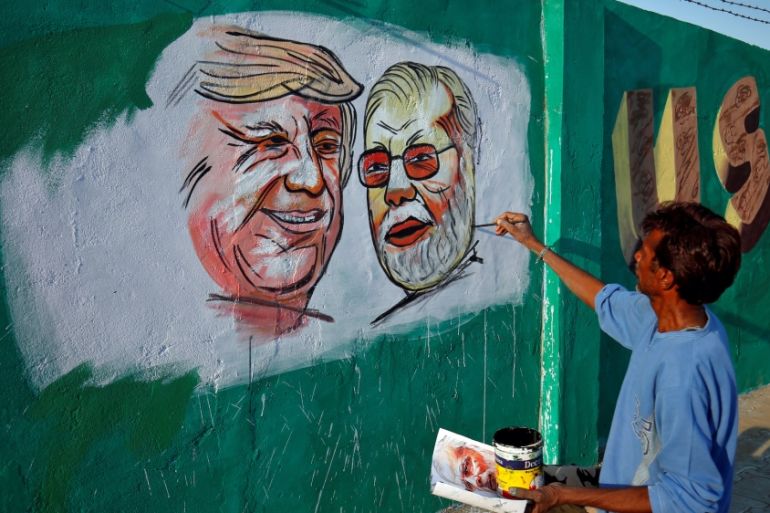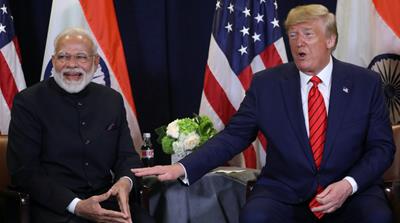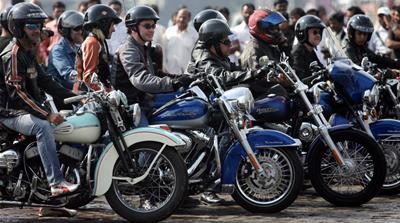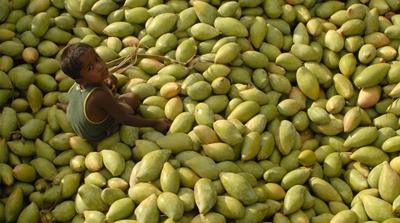As Trump heads to India, a trade deal appears elusive
India and the US remain deadlocked over high tariffs set by New Delhi on motorbikes, medical equipment and other goods.

New Delhi, India – As US President Donald Trump prepared in recent weeks to head to India for his first official visit there, many policymakers and business people had been hoping that it might include a long-awaited trade deal.
Many experts say those hopes now seem to be out of reach, at least for this trip, which is scheduled for February 24-25. The most tangible outcomes of the visit could be Trump’s inauguration of a giant cricket stadium, large crowds gathered to see the US president and plenty of the bonhomie that has become the hallmark of the relationship between Trump and Indian Prime Minister Narendra Modi.
Keep reading
list of 4 itemsPolitics and convenience drive Mexico to be US’s top trading partner
Will Xi and Biden mend US-China relations at the APEC summit?
UK warns of Russia laying ‘sea mines’ to deter Black Sea cargo ships
Negotiators have reportedly been trying for weeks to put together a narrow deal that would give the US greater access to India’s dairy and agriculture markets and reduce Indian tariffs on a host of US products including almonds, chickpeas and motorcycles.
But as the clock counts down to the visit, the chances of a deal remain elusive, especially after US Trade Representative Robert Lighthizer reportedly cancelled his trip which had been scheduled for earlier this month, experts said.
“I don’t know what they’re going to come up with,” Alyssa Ayres, senior fellow for India, Pakistan, and South Asia at the Council on Foreign Relations (CFR), told Al Jazeera. “I don’t think anything that looks like a deal will happen.”
Trump, too, seemed to hint there may not be any trade pacts on this trip when he said: “We can have a trade deal with India, but I’m really saving the big deal for later on.”

The US-India Business Council (USIBC), an advocacy agency, said it was “disappointed” that a trade package seemed unlikely in advance of Trump’s visit.
“A Presidential visit can be a catalyst for action on trade, and we had hoped that the trip would spur both sides to find common ground and reach an agreement,” USIBC president Nisha Biswal told Al Jazeera in an email.
With both the US and India likely to turn their focus to domestic issues including presidential elections in the US in the year ahead, “failure to conclude even a limited trade deal would send a negative signal to industry and investors in both countries,” Biswal said.
Tit-for-tat
The US is India’s second-largest trading partner after China and trade in goods and services hit a record $142.6bn in 2018, according to official US data, up from a measly $11.2bn in 1995. Over the same period, the US’s goods and services trade deficit with India shot up from $2bn to $25.2bn, although the latter is down from a peak of $31bn in 2014.

As that gap widened in India’s favour, so have tensions on a range of topics including tariffs, concern over intellectual property rights and agricultural issues, among others.
Trade has been a thorny issue between past US presidents and India, as well, says CFR’s Ayres, “But Trump has made these things worse.”
One well-publicised example of Trump’s ire over high tariffs imposed by India relates to the motorcycles made by iconic US brand, Harley Davidson.
In a deal struck in 2007, India agreed to import Harley Davidsons and, in exchange, the US agreed to allow imports of Indian mangoes. But India continued to impose a 75-percent import tariff on the bikes, bringing that down to 50 percent after Trump raised the issue in 2017.
More recently, in a tit-for-tat exchange, the US imposed, in 2018, new tariffs on aluminium and steel imports from several countries, including India.
New Delhi responded with a list of retaliatory tariffs, including on imported US almonds, chickpeas and apples, to name but a few, but held off applying them. Soon after, the Trump administration ended preferential tariffs for Indian exports and India responded by implementing the retaliatory tariffs.
Another sticking point for the US has been the customs duties that India levies on medical equipment and devices. Disagreements over this also worsened in 2017 when India imposed price caps on coronary stents and knee implants.
US critics of Indian trade practices used the issue to lobby the Trump administration to end the preferential treatment of Indian exports, experts said. The matter was back on the table now, with the Trump visit in the offing, but has faced stiff resistance from Indian advocacy groups.
Malini Aisola, a co-convenor of the advocacy group All India Drug Action Network, says the freedom to set prices is “the sovereign right of any nation”, and that price regulation should not be up for negotiation.
“[Doing so] runs the risk of foreclosing critical policy options and limiting India’s ability to protect public health,” Aisola told Al Jazeera.
Namaste Trump
One area where there has reportedly been some progress has been defence. Reports earlier this month suggested that India is close to signing a $2.6bn deal to buy US military helicopters.

Aside from trade, Modi has tried to build a personal rapport with Trump, whose visit to India is scheduled to start with Ahmedabad in Modi’s home state of Gujarat, where he is expected to inaugurate a cricket stadium that is being billed as the largest in the world.
“We’re not treated very well by India, but I happen to like Prime Minister Modi a lot,” Trump told reporters on February 18. “And he told me we’ll have seven million people between the airport and the event … So, it’s going to be very exciting.”
The event is being billed as “Namaste Trump”. Namaste is a common greeting in Hindi and a mark of respect.
For Indian companies that deal with the US, this is all pointless, says Sanjay Notani, a partner at the Economic Laws Practice, who has clients on both sides of the trade divide.
“We were expecting a trade delegation,” he said. “But except for ‘Namaste Trump’ and the commitment of getting one lakh (100,000) people in that stadium, I don’t think we have anything else.”